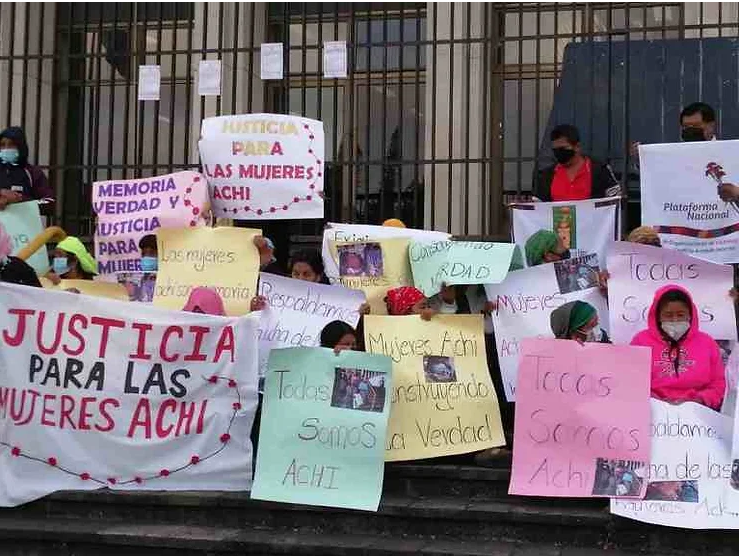A Fight For Justice
By Kirthi Jayakumar
Source: Channel Foundation
A group of 15 Maya Q’eqchi’ women in Guatemala were the first to win a case against former military officials in 2016: The officials were convicted of the systematic use of rape, and sexual and domestic slavery in Sepur Zarco, during the Guatemalan civil war in the 1980s. In January 2022, five Maya Achi women followed suit, securing the conviction of five former paramilitaries for their systematic use of sexual violence and rape in Rabinal, during the civil war. These are powerfully historic moments – given that the indigenous women in Guatemala have long histories of facing oppression and systemic violence in their societies.
The Q’eqchi’ Women of Sepur Zaco
The Q’eqchi’ women of Sepur Zaco filed a case against two military officials for subjecting Q’eqchi’ women to sexual and domestic slavery, and systematic rape in the military base situated in the Sepur Zarco community during the 1980s. There were no Guatemalan guerrillas present in Sepur Zarco. Instead, the local land owners called the military to get rid of community leaders who they claimed were guerrillas. In reality, these men were not guerrillas, but community leaders who wanted to recover the lands stolen from the Q’eqchi’ community.
Over a trial that lasted six years, these women faced a long-drawn judicial process and braved cultural and social obstacles to their access to justice. They faced stigma and were called “the army’s women” by their own community. Their efforts ended with Judge Yasmin Barrios sentencing Lieutenant Coronel Esteelmer Reyes Girón to 120 years in prison for crimes against humanity and murder, and Military Commissioner Edilberto Valdez Asig to 240 years for crimes against humanity and forced disappearance. The sentence also awarded reparations for the women in the form of healthcare and housing programs, and expressly mentions the need for measures to educate the future generations and the military on wartime sexual violence.
The efforts of the women of Sepur Zarco effectively opened up a possibility that affirmed that sexual violence can be proven in a court of law, no matter that three or four decades had passed since it was committed.
The Maya Achi Women of Rabinal
According to the Commission for Historical Clarification, 20% of the Maya Achi were eliminated during the Guatemalan civil war. It was one of the five regions where the army committed acts of genocide. These acts included sexual violence against women, as well, committed by soldiers and paramilitaries alike. In 2011, the Rabinal Law Clinic filed a complaint on behalf of 36 Maya Achi women who were victims of sexual violence between 1981 and 1985. In 2018, the first arrests were made, where seven former members of the civil self-defense patrols in Rabinal were detained. Of these, one died in custody. Three other men who the women denounced escaped and avoided capture.
Following evidentiary hearings in 2019, the charges against six men were dropped – provisionally for three, and definitively for three. However, the women persisted. They had the sitting judge, Judge Dominquez, recused for displaying his anti-indigenous bias and for not taking their testimonies into account as evidence. In 2020, a new judge was assigned and the case was revived. This time, the provisional charges against three men were reinstated. Five of them were tried, and in January 2022, Judge Yasmin Barrios convicted all of them. While the three whose charges were definitively dropped remain free, the Maya Achi women have requested the revocation of the ruling that dropped their charges so that they could be prosecuted. One defendant continues to remain a fugitive. Of the 31 women who filed cases, only 5 were officially part of this particular case, as the other 31 women’s cases were not prosecuted with these proceedings.
Milestones for the Judiciary
To step up and use the apparatus of the state to investigate and prosecute grave violations of human rights during an armed conflict is to take a leap of faith – and to demonstrate the most powerful outcome of exercising agency. In their act of resistance, these women have also asserted themselves in the face of a social order that normalizes stigma and shame, and have pushed past the historical silence around wartime sexual violence. These cases mark a first in Guatemala where a domestic court recognized sexual slavery as a crime against humanity and as a weapon of war. These cases also mark a powerful endeavour on part of the women themselves to localize international humanitarian and human rights law standards to prosecute wartime sexual violence.
The fact that the court ordered a comprehensive reparations program for the survivors – which included economic reparations, healthcare support and psychosocial care, and educational scholarships for their children and grandchildren – is also particularly historic. Rather than remain confined to punitive justice, this endeavour transcended the conventional idea of prosecuting and punishing criminals and moved toward transforming the lives of the women – who have suffered several years of living in conditions of extreme poverty.
While the trial acknowledged the prevalence of sexual violence across the peacetime-wartime continuum, it also acknowledged the many nuances involved in identifying perpetrators and factors that motivate their crime. The five men who were convicted were part of the Rabinal self-defense patrols. They were Achi men, and were deployed by the Guatemalan Army to work against their own community. Through military training and orders, the men were brainwashed into both turning against their own communities and families, and using sexual violence – among other crimes – to do so. The Guatemalan Army intended to get rid of the Maya Achi who opposed the construction of the Chixoy Dam – a project funded by the World bank and the Inter-American Development Bank. In the powerful words of Dr. Velásquez Nimatuj, the trial highlighted the “connection between the predatory capitalist system and the machista and racist system promoted by the State.”
